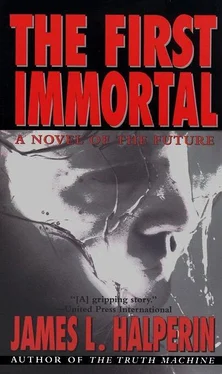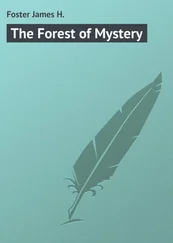Death always brought such pain! It could make survivors renounce God, even hate Him. Some would lose themselves in the company or commiseration of friends, while others found more self-destructive diversions: isolation, alcohol, television, drugs. Widows and widowers who truly loved their spouses would start to remember their most irritating qualities, as if by diminishing the person, they could somehow cut their loss. Conversely, troubled marriages would often blossom into rhapsody when nurtured in the mind’s imperfect recall.
But always there was evasion. Why? Because only time could heal such wounds; allow a scab to grow. And wasn’t that the ultimate irony? Without enough time to live their own lives, they had to spend this irreplaceable time dying the deaths of others. Others they’d loved so dearly.
Ben knew them well; his own kind.
* * *
Marge’s last rational words, two days before she died, had been, “Ben, look after Gary. He needs you. Please. For me.” Everything she’d said to him after that seemed unintelligible. But Ben remained haunted by the notion that deep insight must have existed, hidden somewhere in Marge’s last ramblings.
October 29, 1982
Ben left the house at 7:05 A.M., driving toward nearby Brookline to have breakfast with his mother, as he did almost every day. Alice had the coffee ready and Ben made French toast, which they shared along with the latest family gossip.
Ben marveled at his mother’s acuity. Over time, the operating speed of every human brain slows. But a well-nurtured brain compensates for the loss of velocity by creating new synapses. This Alice had accomplished. She read through two daily newspapers, several magazines, and three to four books a week on diverse subjects, retaining the useful essence. Ben’s children called her often for advice; her knowledge of their interests, their achievements, and even their problems, was encyclopedic.
But at seventy-eight, her body was starting to degenerate, especially her knees and spine. Walking, even with a cane, was becoming arduous. Ben wondered how much longer she’d be able to sustain such an independent existence.
“I’ll be out of town a few days,” he told her. “The girls’ll look in on you.”
“Where you going?”
“Phoenix. Remember Ensign McGuigan?”
“The man who saved my baby’s life? Met him at your college graduation. I wouldn’t likely forget him, would I? Please give him my best.”
“Wish to God I could, Mom. I’m going to his funeral.”
“Oh.” She gazed into his eyes, a deliberate calmness overtaking her. “He had quite a pretty wife. Anna, was it?”
“Annie.”
“Annie. Of course. She’s still…”
“Alive… yes.”
“I doubt she’ll remember me, but would you deliver a message?”
“Okay, Mom.”
“My mother, your Gramma, passed on just seven weeks after Grampa did, remember?”
“Of course.”
“I’m always saddened that so many people die during the first year after their spouse does, but I understand why. When Sam passed away, I was entirely certain I wanted to join him as soon as possible; actually started to wish for my own death. And if I’d kept wishing for it, I think Death might have come to me, too. Of course life will never be the same without your father; I remember him and ache for his smile. Often I cry. But if I’d followed him to the grave, just think what I would’ve missed! I’d never have seen my granddaughters’ weddings, or met any of my four great-grandchildren. Life is the most precious thing there is, Benjamin, so you tell Annie that, from one widow to another. You can’t keep your memories alive if your heart isn’t pumping oxygen to your brain. You tell Annie McGuigan I said the best tribute she can grant her husband is never to give up on her own life.”
Ben hugged his mother hard, suddenly realizing that her message was not really intended for Annie McGuigan at all, but rather for Benjamin Franklin Smith.
He left at 8:37 and stopped at Rebecca’s place. It was on the way and he had plenty of time. She embraced him, not at all surprised; he showed up at each of his daughters’ homes at unpredictable times, but predictably twice a week. His grandson George, my father, who was ten at the time, had already left for school. For the next hour, while Rebecca worked at a drafting table in the next room, Ben sat on the floor playing tea party with Katie, his four-year-old granddaughter. Since he only worked afternoons these days, he often stayed all morning, and wished he could now. It would be so easy just to let this trip go; to lose himself in these visceral joys. But he would not permit himself such an escape.
“I’ll see you two goddesses next week, and George, too, I hope,” he said as he left. “I love you.”
“I love you, too, Grampy.” Katie ran up and gave him a long hug and a quick kiss on the mouth. Rebecca watched, beaming.
At Logan Airport he popped two Valium. He’d hoped not to, but here he was, nowhere near the plane, already shaking like a wet dog on a blustery day. He walked through the X-ray machines, to the gate, and down the boarding chute.
The cabin’s spaciousness surprised him; nothing like it looked from the outside, and remarkably different from the claustrophobic C-47 “Dakotas” he’d flown Stateside after the war. Hell, he could stand straight up and still have six inches to spare. Why hadn’t he realized that before?
He took his seat. The 727 was barely one-third full. And the Valium was starting to work. His perceptions were still sharp, but he felt comfortably detached from them.
A male flight attendant droned through the safety procedures. Ben, on his first commercial airline trip, listened carefully. “Should the air pressure change suddenly, an oxygen mask will drop from the overhead compartment. If you’re traveling with a small child, first place the mask over your own nose and mouth. Once your mask is operational, only then should you do the same for the child.”
That seemed logical. The instinctive reaction for parents would have been to save their children first. But you couldn’t make sure your kids were okay unless you were still alive yourself, now could you?
Ben listened to the rest of the instructions, relaxed. Maybe this wouldn’t be so bad.
And it wasn’t. Until the engine pitch increased and the Boeing began its backward roll.
Suddenly he felt a tightness in his chest. Was this a coronary? He was a doctor, after all. Shouldn’t he have known how to tell? Yes, his father had died at fifty-eight, but his mother was still in good cardiovascular health at seventy-eight. Besides, Toby had recently given him a physical and EKG stress test, both of which had come out well. But now he felt like a grandchild had jumped on his rib cage, forcing all the air from his lungs.
Should he get off and seek medical attention? That’s what he’d have told his patients to do. Probably heavy anxiety, he decided at last. Yes, an anxiety attack. Must be. God, how he hated airplanes.
When the plane finally became airborne, Ben’s pain intensified. Then the Horror flashed through his mind and for a split second he was back on the Asahi Maru, that floating torture chamber. Suddenly, the carbon-dioxide-rich air inside the plane seemed cloying, his breathing became difficult. He began to gasp for air. It felt like a goddamn elephant was squatting on his chest. Instinctively, before becoming aware of it, he started to push the vision from his consciousness. He forced himself to respire evenly. But the dull pain in his chest remained.
To distract himself, he daydreamed about his family, work, Toby, Epstein. Hell, anything pleasant at all.
Gary and Maxine had both received medical degrees, while Rebecca had become an architect and Jan a lawyer. The girls were good in their professions, each having achieved some success. Ben recalled how, once he’d started limiting their television-viewing time, his daughters’ grades had improved markedly, and they’d all earned admittance to top colleges. Thank God.
Читать дальше












